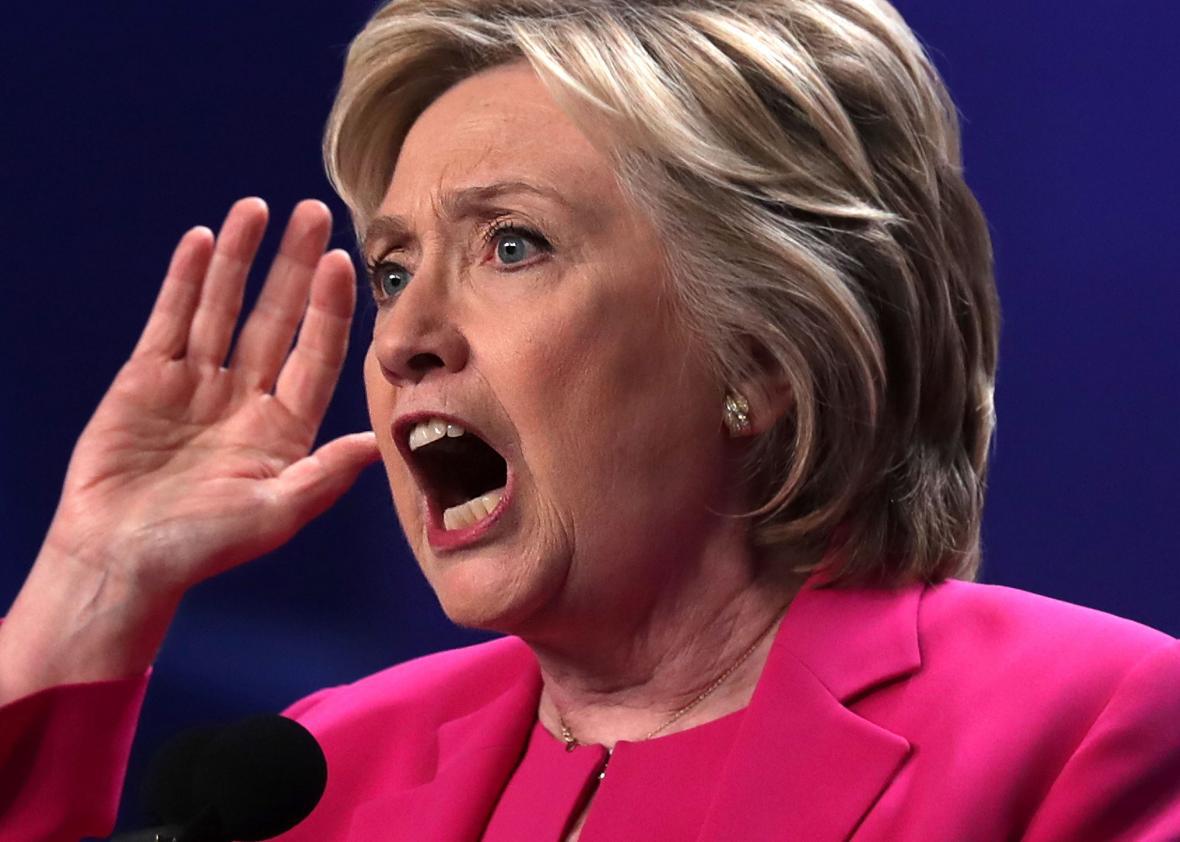All summer long, commentators have been describing Donald Trump’s campaign as a dumpster fire, but there’s a new garbage-related metaphor igniting on the trail: trash-talk. In his debut speech at a Miami rally over the weekend, Clinton’s running mate, Tim Kaine, worked supporters: “Do you want a trash-talking president or a bridge-building president?” Then, he doubled down: “Donald Trump trash-talks folks with disabilities. Trash-talks Mexican-Americans and Latinos. … Trash-talks women. Trash-talks our allies.” Winning the desired boos, he finished with a twist: “He doesn’t trash-talk everybody. He likes Vladimir Putin.”
Clinton herself has since cottoned to Kaine’s use of trash-talking. Speaking to the Veterans of Foreign Wars this week, she answered Trump’s convention speech, which composed a dark portrait of America. Fully broadening the targets Kaine identified in his trash-talk, Clinton objected: “I don’t understand people who trash-talk America, who act as though we are not yet the greatest country.” As the presidential race careens from the conventions to the general election, we’ll be sure to see plenty more actual trash-talking between the nominees. But we should also expect to hear more of the trash-talk line from the Clinton camp. It’s an effective packet of rhetoric, imagery, personal appeal, and cultural history.
The word trash-talk packs a strong rhetorical punch. It doesn’t just concisely characterize Trump’s language as bigoted, as we saw in Kaine’s trash-talking crescendo. It also hits back on loaded implications the Clinton campaign finds in Trump’s wider messaging: “Make America Great Again.” To many, this slogan’s adverbial anchor, again, implies America isn’t great anymore, with Clinton specifically charging that it devalues the hard work and efforts of everyday Americans. By calling out such language as trash-talk, she also threads together who Trump trash-talks with why he is trash-talking them, i.e., America isn’t great anymore because of immigrants. Rhetorically, Clinton’s usage of trash-talk upends Trump’s sloganeering as covert scapegoating and fearmongering.
The word trash-talk also carries an evocative image. The Clinton campaign can—and does—avail itself of any number of words to describe Trump’s verbiage: insulting, bullying, offensive, divisive. (Others would surely add racist, sexist, vulgar, and xenophobic to the list.) These modifiers, regardless of accuracy, are abstract. But trash-talk, owing, of course, to its core metaphor, runs on garbage. In depicting his language as trash-talk, Clinton and Kaine challenge voters, “Who is Trump to speak about America as if it’s garbage?” On the one hand, the image arouses indignation and outrage. On the other hand, it brands Trump as a someone who treats people as if they are disposable.
Through stereotypes and generalizations, one can easily disparage whole groups of people. Trump has done this. But talking trash is different. Take, for example, “Low-energy Jeb,” one of the stickier epithets Trump issued earlier in the race. “Low-energy” indicts former candidate Jeb Bush’s personality, not his ability to govern. It’s taunting. It’s below the belt. It’s going-out-the-way name-calling. It’s personal. But as a word, trash-talk is also personal. It’s gritty. It’s street. It’s playful. It’s vernacular. By labeling it as trash-talk, Clinton portrays Trump’s language as personal attacks on Americans without herself making a personal attack, all while sounding personal.
Finally, we’ve become so inured to trash-talking in politics that it’s easy to forget where trash-talking first originated: sports. The Oxford English Dictionary first finds the term trash-talking in reference to baseball back in the early 1970s. Sports-based bad-mouthing, no doubt, has a rich history and culture. Muhammad Ali, for instance, flexed political and poetic power with his boasting. But trash-talking can also serve up bread and circuses. To its targets, talking trash is a mind game, using detractions to create distractions. To its viewers, trash-talking is a form of theater, creating spectacle out of conflict. From World Wrestling Entertainment and The Apprentice to his debates, rallies, and tweeting, Trump has made trash-talking a sport all its own. In deploying the term, Clinton’s trash-talk ties Trump’s language back to entertainment and gamesmanship. It moves the spotlight from the offensiveness of the trashing to the seriousness of the talker: Is the U.S. presidency, Clinton’s trash-talk asks, just another show, just another contest for Donald Trump? If so, he’s playing a dangerous game.
